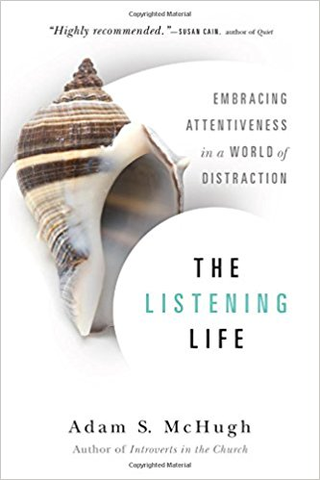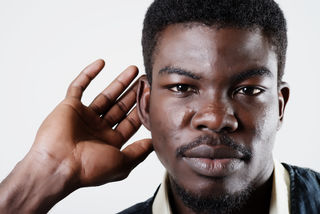Attention
Laser Listening: Paying Attention from Inside Out, Part 1
Improve your interactions, despite the distractions.
Posted May 29, 2017

In our fast-paced, non-stop world, distractions abound. Some are external. Some are internal. Even if you think you’re a decent listener, Adam S. McHugh, author of The Listening Life, can show you how to go far beyond the typical complement of eye contact, nods, and uh-huhs to connect at a much deeper level with your conversation partners. Imagine how that would feel for both you and them. Consider how it would strengthen your relationships at work as well as in your personal life.
I’m delighted to interview McHugh about finding a meaningful way to listen that gives credence to his book’s subtitle, Embracing Attentiveness in a World of Distraction. As background, McHugh, who wears many hats, including those of a spiritual director, ordained minister, sommelier, and wine tour guide, is also the author of Introverts in the Church. This three-part interview is a corollary to the practical tips I share for introverts in “Listen Your Way Up the Ladder.”
NA: Many of us think we listen. Some of us are better at it than others. Some are better at listening in certain situations. How do you describe listening? What is new or different about your understanding of it?
ASM: One of the greatest obstacles to listening is that most of us already think we are good listeners. If someone writes a book about listening, then we assume that other people need to read it. That is because most of us interpret listening as the opposite of talking. As long as I sit quietly while another person speaks, then I am an adequate listener. It doesn’t matter what I am thinking about while the other person is talking; as long as I don’t interrupt or speak over them, then I have done my job of listening. I have waited my turn and once they are finished, I can say my part.
To me, listening is a practice of focused attention. By that, I mean not only an outward appearance of attention, but an inward attention. That is the hard part, but also the true measure of listening. You can actually have the outward trappings of listening – eye contact, appropriate posture, active listening sounds – without truly listening. I know, because I have done it. Listening is an attention that happens on the inside, and thus the listener is the only one who knows whether they are truly listening. Are you devoting your internal attention as well as your outward attention to another person? That is the question that drives the person who wants to become a genuine listener.

NA: In your book, you mention the “transformative power of being heard.” What do you mean by that?
ASM: I come from a religious tradition that is known for talking, where words flow like cheap wine. I have a vivid memory of a colleague years ago heading to visit someone in the hospital. As he left, he said to me, “Time to speak some truth.” Even back then, before I started to think much about listening, that felt odd. Does someone in pain or in doubt need someone to preach to them? Advice isn’t going to rescue you from suffering. If anything, it’s going to make you feel more isolated.
What a hurting person needs is to be heard. I have myself experienced the healing power of being heard. I have also had the privilege on many occasions to witness the healing that reveals itself in the eyes of someone who has been genuinely heard. A million beautiful and true words cannot convey love like genuine listening.
NA: One of my favorite quotes from your book is, “Power is an effective ear plug.” Would you describe the inverse relationship between power and listening? What do you see as the antidote?
ASM: It would seem that power and listening have an inverse relationship in our society. The more power you amass, the less you are required to listen. The directional flow of listening is from bottom to top. The people with less status are the ones who are expected to listen to those above them. Children are expected to listen to parents, students to teachers, employees to bosses, poor to the rich, minorities to the majority. The pattern, sadly, seems to be that the more you climb the ladder, the less you listen.
When I lead listening workshops, I ask: Has there ever been someone in your life who surprised you with listening? A boss, an elder, a priest, a teacher? Someone whom you expected to speak or instruct or correct, but who instead listened to your input, your thoughts, your feelings?
For me, it was a woman named Donna who led a hospital internship program I participated in as part of my training. I met with her once a week in a supervisory capacity, and I expected her to try and fix me like most of my other mentors had done in the past. Instead, she asked questions and she genuinely listened to my responses. She inverted the listening order. Here was an authority figure who actually listened to me. And I was changed through it. Her example is one of the main reasons I am so devoted to listening.
NA: What do you mean when you suggest, “if listening is the inhale, then acting is the exhale”?
ASM: Listening and acting are often placed in opposition to one another. Sometimes this is categorized as “contemplation” versus “activism.” Contemplatives sit in their little rooms of solitude listening and meditating, whereas activists are out working, making a difference, and doing stuff. This is the same conflict that introverts and extroverts get divided over.
I often hear the word “listen” preceded by the word “just.” “I didn’t know what to do, so I just listened.” That sounds as though listening is a last resort, the response of someone who is at a loss for a truly productive action! This is a false dichotomy. Listening is itself an action, and it is a necessary beginning in a whole-bodied response. I argue in The Listening Life that we have not truly listened unless we act on what we hear. You listen with your ears, but you also listen with your feet.

NA: What a powerful insight. You describe empathy in connection with tuning into the emotion behind the specific content that someone says. In your book, you use the term “listening for genre,” What do you mean by that?
ASM: One of the most frustrating experiences for someone who wants to be heard is when the other person can’t hear the tone or the pathos underneath their words. This happens so often that we normalize it. Just about every day, I overhear a conversation in which someone expresses a frustration and another person reacts in a way that invalidates the struggle. Just yesterday, I heard a young woman tell an older couple that she had been having health problems, and they immediately launched into potential solutions and their own experiences that only tangentially related to hers.
You can tell when someone is not being heard; their eyes glaze over and they go quiet. And this couple was genuinely trying to be helpful. But if only they could have realized that a simple statement like, “That is scary and unsettling. I am so sorry,” would have gone so much farther than a full quiver of prescriptions!
In the Bible, there is a line that perfectly captures what I mean by listening for genre: “Rejoice with those who rejoice, weep with those who weep.” The best listening responds to, and echoes, the tone of the speaker. This doesn’t just apply to grief or pain. Haven’t we all had the experience of someone killing the buzz of our excitement over something? In my family, we call this “killing the moment.” You want to share your joy with someone and they respond with indifference or a selfish question.
NA: Would you give an example of killing the moment?
ASM: Sure.
Wife: “I met with my boss today, and I got a promotion and a raise!”
Husband: “Does that mean you will be working even more hours?”
Wife: “Well, you killed that moment.”
So, listening for and responding to the genre of the speaker is another way of discussing empathy. Empathy involves temporarily taking onto yourself the thoughts and feelings of another person and trying to see, think, and feel as they do. When you miss that opportunity, you miss the chance for greater intimacy and understanding – and you might kill the moment.
NA: Adam, thank you for offering your insightful perspective on the difference between outward attention and genuine inward attention, the “transformative power of being heard,” the inverse relationship between listening and power, and the importance of truly stepping into the shoes of others.
In the second part of this three-part series, McHugh shares additional insights about how to listen deeply to yourself, including a refreshing way to manage your negative self-talk as well as the importance of hearing what your body is trying to tell you.
Copyright 2017 © Nancy Ancowitz




